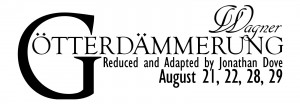Composed by Richard Wagner
Premiered at Bayreuth Festspielhaus on August 17, 1876
New Adaptations by Graham Vick and Jonathan Dove
First performed in 1990, Birmingham, England
August 21, 22, 28, and 29, 2015
Performed in German
- Alexandra LoBianco as Brünnhilde
- David Dillard as Gunther
- Clay Hilley as Siegfried
- Neil Nelson as Hagen
- Melissa Kornacki* as Waltraute
- Timothy Lafontaine* as Alberich
- Lindsey Anderson as Woglinde
- Rebecca Wilson* as Gutrune
- Lauren Wright* as Flosshilde
- Johanna Nordhorn as Welgunde
- Marc Schapman - a Vassal
- Clark Sturdevant - a Vassal
- Winston Sullivan - a Vassal
- Karen Coe Miller - Director
- Scott Schoonover - Conductor
*UAO stage debut
Background – The story of the Ring
The Ring and its history are an important part of the Ring’s continuing saga. Alberich, the Nibelung dwarf, forged the Ring from the Rhinegold that he stole from the Rhinemaidens. The gold was cursed by the Rhinemaidens when it was stolen — a ring made from the gold would gain power over the world, but the one possessing the gold must first renounce love. When the Ring was taken from Alberich by Wotan and Loge, to be used as payment for the god’s castle in Valhalla, Alberich added a death curse to the Ring. Fasolt, the giant, was the first to die at the hands of his brother, Fafner, in a dispute over the treasure. Next, Fafner, the giant disguised as a dragon, was slain by Siegfried who is in possession of the ring at the beginning of Götterdämmerung. Erda had presaged to Wotan that the Ring would spell the end of the gods and Valhalla unless it was returned back to the Rhinemaidens. Despite these curses, the possession of the Ring continues to be a driving motivation for acts of violence, death, and scheming plots throughout the Ring cycle.
In the opera Die Walküre, Wotan punished his daughter, Brünnhilde, for defying his commands. Wotan took away Brünnhilde’s demigod powers and put her into an enchanted sleep. A ring of fire, that only the bravest hero could withstand, protected her. At the end of the opera Siegfried, Siegfried fought and vanquished Wotan, breaking his spear in order to gain access to the sleeping Brünnhilde. Siegfried walked through the fire and awakened Brünnhilde with a kiss.
Prologue
Siegfried gives Brünnhilde the Ring as a token of their union and sets off for new adventures.
Act I
In the Gibichungs’ Castle on the banks of the Rhine, Gunther, the king of the Gibichungs, and his sister Gutrune, both unwed, ask for sage counsel from their half–brother Hagen. Plotting to secure the Ring, Hagen advises Gunther to consolidate his power by marrying Brünnhilde. He also counsels that Gutrune should marry Siegfried. Gutrune questions how a hero like Siegfried could want her as a wife. He must have many other women.
Hagen gives Gunther and Gutrune a magic potion that would induce Siegfried to forget all other loves. Under the potion’s influence, Siegfried would fall in love with Gutrune. Gunther and Gutrune enthusiastically agree to pursue this dastardly plan.
Siegfried’s horn–call announces his approach to the castle. Gunther graciously welcomes Siegfried into the Gibichung Castle. Gutrune offers Siegfried a customary drink of hospitality. Siegfried is unaware that the drink is actually a potion designed as both an elixir for amnesia and a uniquely–designed love potion. Siegfried toasts Brünnhilde and his love for her. Siegfried drinks the potion, and he instantly forgets all about Brünnhilde and his pledged affection for her. Quickly succumbing to Gutrune’s beauty in his now drugged state, Siegfried gladly agrees to bring Brünnhilde to Gunther for his bride.
Siegfried and Gunther swear an oath to blood and brotherhood with a drink from the ceremonial drinking horn — Siegfried and Gunther drink, but Hagen does not join in the oath. Siegfried and Gunther depart to bring Brünnhilde to the Gibichung Castle from her rock. Hagen begins his anxious vigil for the “wedding party’s” return, gloating over his cunning scheme to beguile the so–called masters to ultimately secure the Ring for him.
On Brünnhilde’s rock, Waltraute, a Walküre, visits her sister, Brünnhilde. Waltraute tells Brünnhilde that Wotan has warned the gods that their doom is sealed unless Brünnhilde returns the Ring to the Rhinemaidens. She refuses to give up the Ring that Siegfried gave her to secure their love-bond. Waltraute departs in utter despair.
Dusk falls as Siegfried appears, transformed into Gunther by means of the magic Tarnhelm helmet. The disguised Siegfried claims Brünnhilde as Gunther’s wife. Brünnhilde resists and violently struggles, but she is eventually overcome. Siegfried, still disguised as Gunther, wrests the Ring from the terrified Brünnhilde’s hand and places the Ring onto his own finger.
Act II
At night, outside Gibichung Castle, Alberich approaches his sleeping son, Hagen, who is trying to keep watch for the return of Siegfried’s party and the Ring. On Alberich’s urging, Hagen swears to kill Siegfried and regain the Ring. Alberich departs as dawn breaks. Siegfried, having returned to his own form by removing the Tarnhelm, arrives ahead of Gunther and Brünnhilde. He boasts that he has successfully won Brünnhilde as Gunther’s bride — they are following close behind him. Hagen summons the castle’s men by sounding the war–alarm. The men are surprised to learn that the call was not to arm but instead was intended to prepare for the party of their master’s wedding to Brünnhilde.
Gunther enters leading Brünnhilde, who looks defeated and weary. She is surprised to see Siegfried and recoils. Noticing the Ring on Siegfried’s finger, she deplores the trickery in the way that she was won and betrayed — the man who conquered her was not Gunther but must have been Siegfried in disguise. Brünnhilde proclaims that Siegfried was the one who seduced her as himself. Therefore, Siegfried remains her true husband. Siegfried, still acting under the drugged potion’s spell, vows upon Hagen’s spear, that he has never wronged the woman. Taking the spear point from him, Brünnhilde angrily swears that he is lying.
Siegfried categorically dismisses Brünnhilde’s accusations and leaves with Gutrune to prepare for their marriage. The dazed Brünnhilde, bent on revenge, reveals Siegfried’s one vulnerable spot to Hagen — a blade in his back will kill him. Gunther is shamed and troubled by Brünnhilde’s claims of the false oath that Siegfried swore on his weapon. Taunted by Brünnhilde’s charge of falsehood and lured by Hagen’s tantalizing description of the Ring’s power, Gunther willingly joins in the murder plot to kill Siegfried and secure the Ring. Hagen and Gunther plot to lure Siegfried on a hunting trip to murder him.
Act III
Near a rocky slope on the banks of the Rhine, the three Rhinemaidens continue to bewail their lost treasure. Soon, Siegfried approaches, having wandered away from his hunting party. The maidens plead for the Ring, but he ignores their entreaties and warnings. Hagen approaches and plunges a spear into Siegfried’s back and stalks off. In his last moments, Siegfried’s memory returns. Hailing his devout love for Brünnhilde with his last breath, Siegfried dies. The men bear Siegfried’s slain body away.
At the castle, Gutrune nervously awaits her bridegroom’s return. Hagen, the first to return from the hunting party, tells her that Siegfried has been slain by a wild boar. When his body is carried in, Gutrune realizes the ruse and accuses Gunther of murder. Hagen admits to the crime and blames Gunther. Quarreling over the possession of the Ring, Gunther is killed by Hagen. Hagen advances to remove the Ring from Siegfried’s finger but falls back in fear when Siegfried raises his arm.
Brünnhilde appears and orders a funeral pyre built for Siegfried. Musing on the gods’ responsibility for Siegfried’s death, and everyone failing to honor the memory of Siegfried, Brünnhilde takes the Ring. Addressing Wotan, she declares that Siegfried died to absolve the world of the Ring’s curse, and that she will return the Ring to its rightful owners. Placing it on her own finger, she throws a torch onto the funeral pyre and walks into the flames. As the castle is consumed by fire, the river Rhine overflows its banks. Hagen rushes in to save the Ring, and the Rhinemaidens drag Hagen to a watery grave. The flames grow and leap upward to engulf Valhalla. The Ring is reclaimed by the Rhinemaidens, and its curse is broken.
The era of the gods has now ended and a new era has begun.



























